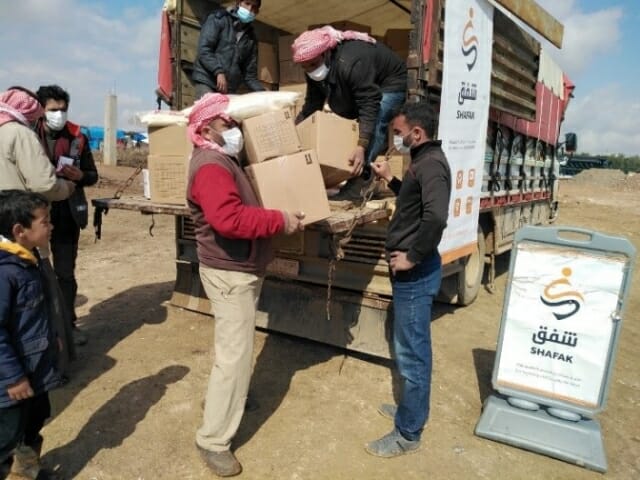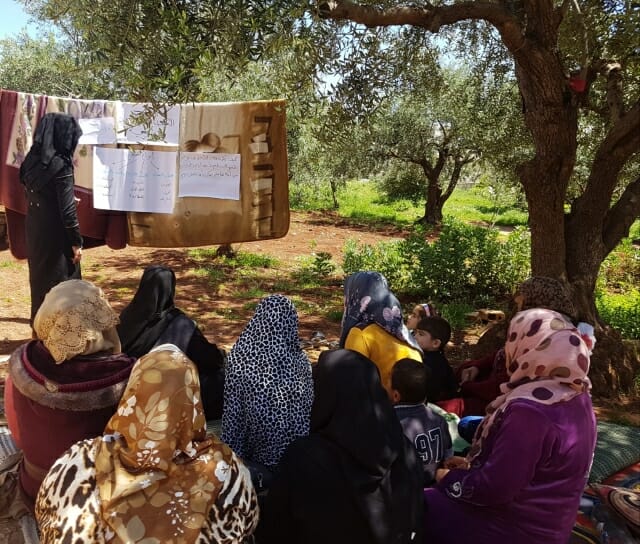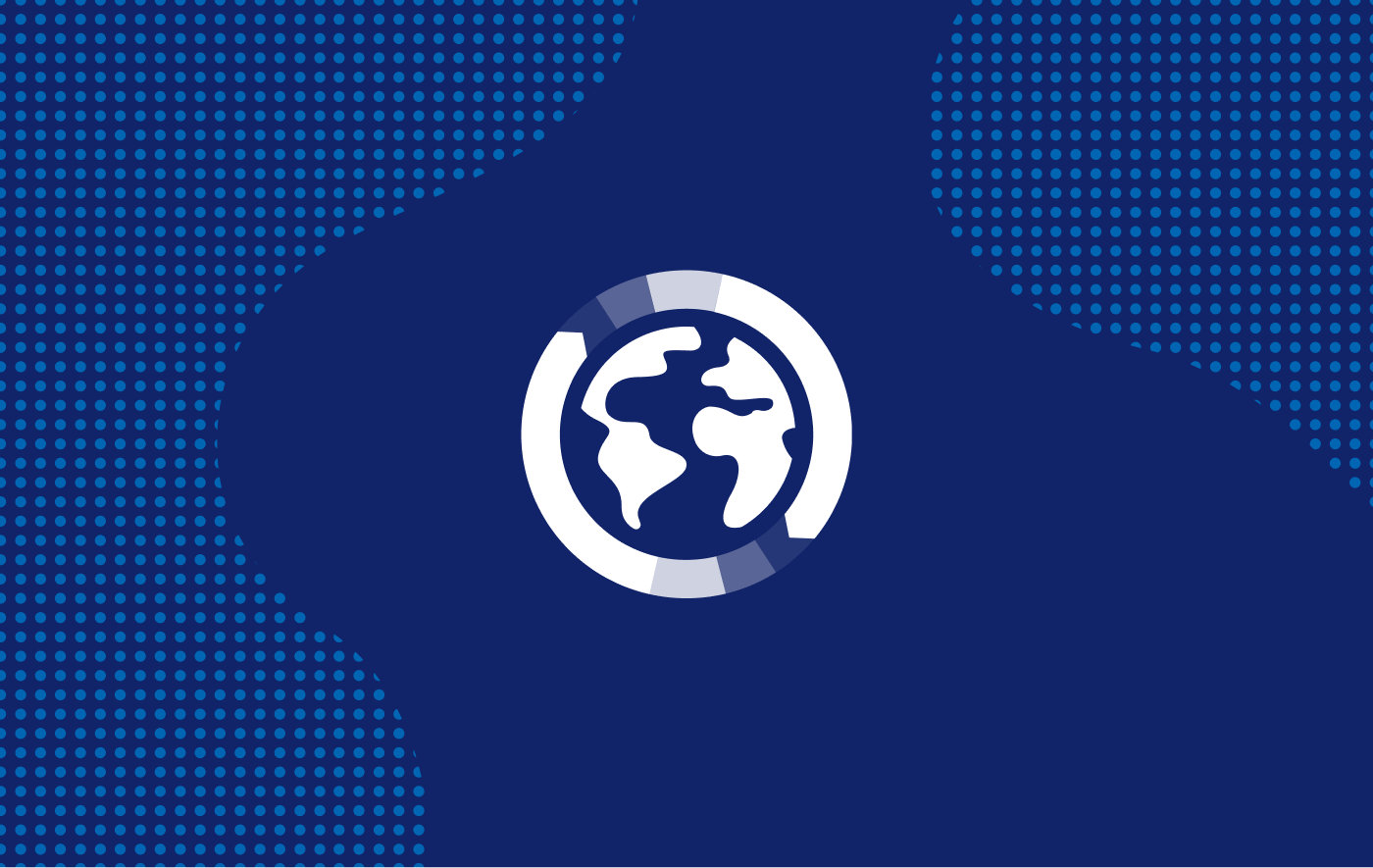Global Communities began providing humanitarian assistance in Syria in 2014, following the start of an armed conflict that has lasted more than a decade and uprooted more than half of the country’s population. There are at least 6.7 million Syrians living as internally displaced persons, with 1.9 million in camps or informal settlements, while another 5 million have sought shelter abroad as refugees.
To help meet the needs of the most vulnerable in this crisis, Global Communities focuses heavily on food security, shelter, livelihoods, protection, and water, sanitation and hygiene (WASH) activities. Global Communities’ approach goes beyond handing out goods. We engage with communities and Syrian organizations in the region
to help Syrians fleeing their homes cope with the enormous demographic shifts that have taken place, adapt to their new lives and livelihoods, and build resilience.
This includes providing emergency shelter kits and lifesaving food assistance, supporting local economic recovery through livelihoods support and value chain development, rehabilitating homes in host communities and repairing critical water supply systems. We also facilitate access to essential health information, including COVID-19 prevention measures, and establish safe spaces where women and young people can engage in recreational and informal education activities and receive psychosocial support and other protection services.
Supporting Agricultural Livelihoods in Syria
Agriculture once accounted for 80 percent of employment in Syria, but the conflict has devastated the country’s agricultural economy. Global Communities, with funding from the U.S. Agency for International Development (USAID), is implementing the Supporting Livelihoods in Syria (SLS) program in northern Syria. From March 2019 to March 2022, Global Communities is supporting urgently needed food security and agriculture-based livelihoods recovery, while encouraging the regeneration of stable market systems. SLS’s system-based approach builds resilience by engaging market actors in communities whose main livelihoods prior to the crisis depended on the production of staple crops and livestock rearing.
Empowering Women and Girls
With private funding, Global Communities is expanding the reach of existing programming in northern Syria to promote the protection, empowerment and psychological well-being of approximately 1,450 women and adolescent girls ages 10 and up. This 15-month intervention (October 2020-January 2022) provides women and girls with critical gender-based violence prevention activities, including awareness raising, psychosocial support, life skills training and informal education, recreational activities, community dialogue sessions on gender equality and gender-based violence, Women’s Committees and adolescent girls peer support groups.
Increasing Water, Food and Shelter Security across Syria
With funding from USAID’s Bureau of Humanitarian Assistance (USAID/BHA), Global Communities’ Assistance to Lives Across Syria (ATLAS) program will benefit a total of 359,000 conflict-affected Syrians in north Syria. Over the course of a year (July 2021-July 2022), ATLAS aims to increase food security for 119,000 individuals through food and agricultural assistance as well as market strengthening. In addition, the program will improve living conditions for 240,000 individuals through critical protection, WASH and shelter interventions, and through integrated humanitarian coordination and information management support for 50 local Syrian and international organizations.
Social Cohesion in Turkey
With funding from the U.S. State Department’s Bureau of Population, Refugees and Migration, Global Communities and its partners are implementing the 24-month Cohesion and Livelihoods Opportunities through Shelter Empowerment (CLOSE) program (September 2021-August 2023) to improve the safety, security and dignity of 1,400 vulnerable refugees and host community households in southern Turkey. The CLOSE program focuses on supporting shelter improvements and access to income generating opportunities while strengthening relationships and a sense of well-being among Syrian refugees and host community members. Social cohesion activities are led by our local partners and include Turkish language and workplace culture sessions, field visits to Turkish vocational workshops, training on IT skills, marketing and CV preparation, and a focus on issues such as active citizenship, problem solving and decision making.
50,000
emergency shelter NFI kits provided to conflict-affected households, improving living conditions for more than 300,000 Syrians
1,000
chlorinated water trucks that delivered 25 liters of water per person a day for 200,000 Syrian refugees at Atmeh camp
$5.5 million
distributed as electronic vouchers for 40,000 families in Atmeh camp to support them in purchasing hygiene items
229,000
food baskets distributed per family every month to save food security for more than 160,000 Syrians
Recent Programs
Sowing the Seeds of Food Security
Displaced people rely on food assistance to survive as the conflict persists, local economies deteriorate, the cost of food skyrockets and agricultural production remains low. According to the 2020 Humanitarian Needs Overview, more than 9 million people are food insecure across Syria, and 3.7 million of them live in northwest Syria. In response, Global Communities, with funding from USAID/BHA, implemented the Investing in Nutrition in Syria, Promoting Infrastructure and Resources in the Economy (INSPIRE) program. From June 2019-September 2021, INSPIRE delivered an integrated package of assistance to meet emergency food needs of the most vulnerable and support household and community food security in north Syria. The program supported a total of 508,021 Syrians by distributing monthly food baskets, ready-to-eat rations, bread, and kitchen garden kits, and by assisting with mill and bakery rehabilitation. Additionally, fodder kit distribution and mobile fodder mills aided struggling displaced livestock breeders.
Addressing Urgent Multi-Sector Humanitarian Needs across North Syria
Global Communities’ USAID/BHA-funded Response Operations for the Syria Emergency III (ROSE III) program saved lives and alleviated the human suffering of 240,000 conflict-affected Syrians in north Syria. Activities implemented from August 2020-November 2021 included increased protection of vulnerable crisis-affected populations (women, children, the disabled and the elderly) through integrated protection services; improved living conditions for camp residents through provision of winterization support, transitional shelter and disaster risk reduction measures; and improved water supply, solid waste management, sanitation system supply and hygiene promotion for camp residents.
Our Work in Syria
Disaster Risk Reduction & Response
Mitigating Future Risks to Reduce Vulnerability
Early Recovery & Market Systems
Advancing Market-Based Recovery
Food Security & Agricultural Livelihoods
Promoting Post-Emergency Food Production
Shelter & Settlements
Temporary Homes for Dignity, Safety and Privacy
Gender Equality & Social Inclusion
Lifting Marginalized Voices and Investing in Women as Leaders and Men as Allies
Health
Combating Disease, Improving Nutrition, and Ensuring Healthy Mothers, Children and Adolescents
Economic Opportunity
Advancing Job Training and Market Linkages for Sustainable Livelihoods
Resilience
Enhancing Food Security, Sustainable Agriculture and Water Management in Climate-Affected Communities
Protection
Preventing, Mitigating and Responding to Exploitation and Harm
Building Resilience
Innovations to Lay the Foundation for Long-Term Recovery
Sustainable Development
Standing with Communities as They Shape Their Own Future
Food Security & Nutrition
Delivering Food Aid and Promoting Sustainable Livelihoods
Resources
Briefs & Case Studies
CVCFG: ASGM Logistics in Eastern DRC Learning Brief
USAID’s Commercially Viable Conflict-Free Gold (CVCFG) Project, known locally as “Zahabu Safi” is a five-year project, implemented in the Democratic Republic of the Congo (DRC) by Global Communities and Levin Sources. The project is designed to build on recent successes achieved by donor-funded initiatives to export responsibly sourced gold to jewelry buyers in North America…
Briefs & Case Studies
Program Brief: USDA Chakula Chetu Local and Regional Food Aid Procurement Program in Tanzania
In 2017, USDA funded a Local and Regional Food Aid Procurement (LRP) program, called Chakula Chetu, meaning Our Food in Swahili. Chakula Chetu complements Project Concern International (PCI), a Global Communities Partner’s McGovern-Dole program in Tanzania, FFE III. Emphasizing local capacity strengthening to promote long-term ownership and sustainability, Chakula Chetu delivers a cost-effective and timely…
Research & Publications
An Infant Carrier Intervention and Breastfeeding Duration: A Randomized Controlled Trial
Emily E. Little, PhD, CLEC, Camille C. Cioffi, PhD, Lisa Bain, MPH, Cristine H. Legare, PhD, Jennifer Hahn-Holbrook, PhD OBJECTIVES: Parent-infant skin-to-skin contact immediately after birth increases initiation and abstract duration of bodyfeeding. We hypothesized that providing ergonomic carriers to parents during pregnancy would increase the likelihood of breastfeeding and expressed human milk feeding through…
Briefs & Case Studies
Improving Key Water, Sanitation and Hygiene Practices in Ghana Through A Behavior-Led Approach
Years of effort and focus by the Government of Ghana and its partners have yielded significant improvements in the country’s child morbidity and mortality rates. Still, every year, at least 4,000 Ghanaian children die from diarrhea, and 23% experience chronic malnutrition linked to poor water and sanitation.(1) To help improve these numbers, USAID funded the…
Toolkits & Manuals
Guía Metológica para Análisis de Rumores sobre COVID-19
El abordaje metodológico y analítico sobre rumores constituye la base fundamental que proporcionará la información y resultados necesarios para la erradicación efectiva de rumores prevalentes sobre COVID-19. La presente guía describe los pasos metodológicos a seguir, tanto para el análisis de datos como para la formulación de los mensajes antirumores.
NEWS
Latest stories from the blog

Mentorship Program Offers a Helping Hand for Young Syrians
While the conflict in Syria has lasted more than a decade, protection risks remain high across the country and have been heightened by the coronavirus …
Read More
Programming in Syria has Great Impact on Food Insecurity
A more than ten-year-long crisis in Syria has affected the country’s entire population. Hundreds of thousands of Syrians have been killed and millions have been …
Read More
A Decade of Conflict: Protection Issues for Displaced Persons in Northern Syria
The decade of armed conflict in Syria resulted in some 6.7 million internally displaced persons and at least another 5.0 million Syrians who have sought …
Read More
Protection in Northern Syria
The Path Forward is a CSIS Humanitarian Agenda series of reflections from humanitarian organizations on the challenges in food security, disrupted health systems, humanitarian access, civilian …
Read More
